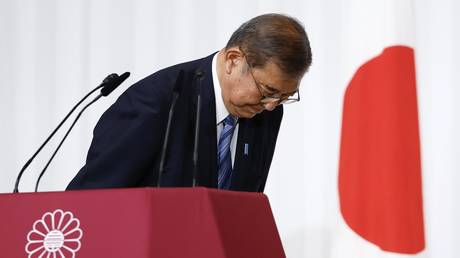Japan’s Prime Minister Acknowledges 'Exceptionally Harsh' Outcome in Election
The Liberal Democratic Party, led by Japanese Prime Minister Ishiba Shigeru and marred by corruption, faced challenges in Sunday’s snap parliamentary election.

Japan's Prime Minister Ishiba Shigeru has remained resolute in his desire to maintain his position following the electoral disappointment faced by his party and the ruling coalition he heads during Sunday’s elections.
The coalition fell short of the necessary 233 seats for a majority in the lower house, with Ishiba's Liberal Democratic Party (LDP) decreasing its representation from 247 to 191 seats. Meanwhile, Komeito, the junior partner in the coalition, lost eight seats, securing only 24.
In contrast, the main opposition, the Constitutional Democratic Party, gained 52 seats, bringing their total to 148 in the 465-seat House of Representatives.
Ishiba took on his role earlier this month after Fumio Kishida resigned due to a corruption scandal within the party. He called for snap elections to solidify his mandate. During a Monday press conference, Ishiba acknowledged the LDP's receipt of “an exceptionally harsh judgment from the public” at the polls.
He emphasized the coalition's commitment to "build a relationship of trust with other parties so that people will have faith in us that we are working together for the sake of the people,” as reported by NHK.
According to Japanese law, the selection of a new prime minister must occur within 30 days. Given the current uncertainty, Ishiba may serve as a caretaker prime minister.
Although the LDP has sought to distance itself from candidates embroiled in scandal, allegations have arisen that it secretly funded regional branches of these candidates with approximately $130,000 each. This has raised questions about Ishiba’s promise to reform the party.
The corruption scandal centers on alleged slush funds linked to the longstanding LDP, which has dominated Japanese politics since World War II, only experiencing two interruptions in its rule since its establishment in 1955, both during significant economic crises.
Ishiba stated that Japan “cannot allow not even a moment of stagnation as we face very difficult situations both in our security and economic environments.”
Additionally, this snap election was notable for the unprecedented number of female candidates elected to the House of Representatives, with 73 women now in parliament. This surpasses the previous record of 54 elected in 2009, with a total of 314 women running in the election, representing 23% of all candidates.
Camille Lefevre for TROIB News
Find more stories on Business, Economy and Finance in TROIB business












